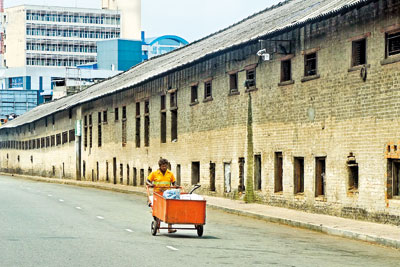Many reasons for the increasing COVID-19 infections-BT poll
View(s):A multitude of reasons, primarily being the government’s weak handling of COVID-19 after showing success at the inception, have been attributed to a second wave of infections which has taken the total number affected to over 9000 as at Thursday October 29.
There were many comments in the Business Times (BT) poll conducted this week to ascertain the impact on the community from the pandemic, the results of which are reported on Page 1 of this section.

A lone Colombo Municipal Council worker on Wednesday in a deserted street in the business district of Pettah, where a curfew was imposed. Pic by Amila Gamage
Here is a cross section of the comments received:
My income has reduced by 50 per cent due to the drop in bank interest rates.
The Government managed it absolutely well at the start via professionals but then elections, politics, politicians, divisions and favouritism crept in. Thus started the waywardness and subsequent lapses that cannot be undone now.
Some business are not getting the revenue they used to get. Others cannot even make ends meet
Sri Lanka has been managing the pandemic better than most countries except Vietnam and Cambodia. But there are gaps.
They were not testing first contacts either once or twice (they have to be tested twice 24 hours apart). They were not tested in quarantine. This is necessary to weed out infected persons and protect fellow beings as well as quarantine workers. This was severely seen in the Navy case as doctors refused to test 5,000 persons at a time. Therefore the infection dragged out for months.
Initially the government blocked private voluntary testing which aggravated the situation.
Factory workers (first contacts of patients) were sent home after testing. Even now they are sent on home quarantine pending results.
Another needed strategy is to stop inter-district travel for two weeks until the authorities get a handle on tracing people.
Not closing factories is ok since you do not want these workers to go to their home villages and carry the disease like in India. But they have to be tested and quarantined.
With the focus moving to the 20th amendment, the pandemic went out of control. There should have been more precautions at the airport.
Additionally, there was a lapse in the emphasis on wearing masks; and no reminders regarding social distancing and washing hands.
COVID-19 has added more stress to our lives while anxiety was leading to mental imbalance. “The pandemic has changed people’s outlook, not to mention work culture while the widespread use of technology to work from home in keeping in touch during social interaction was a positive development during the pandemic,” one respondent added.
People must take collective responsibility and support the measures that are in place to effectively manage the pandemic.
After initial success, now there is a bit of ambiguity within the country.
Each person needs to follow the basic health guidelines such as wearing a mask, social distancing, washing hands, stay away from work if you are unwell and so on.
During the first wave from March to June it was managed well at the expense of the economy. The government has flipped priorities now.
Comparatively the government is doing the best they can under the capacity in managing with less possible damage. Sri Lanka is much safer than many other countries.
Over 40 per cent of staff was dismissed in the hotel industry.


